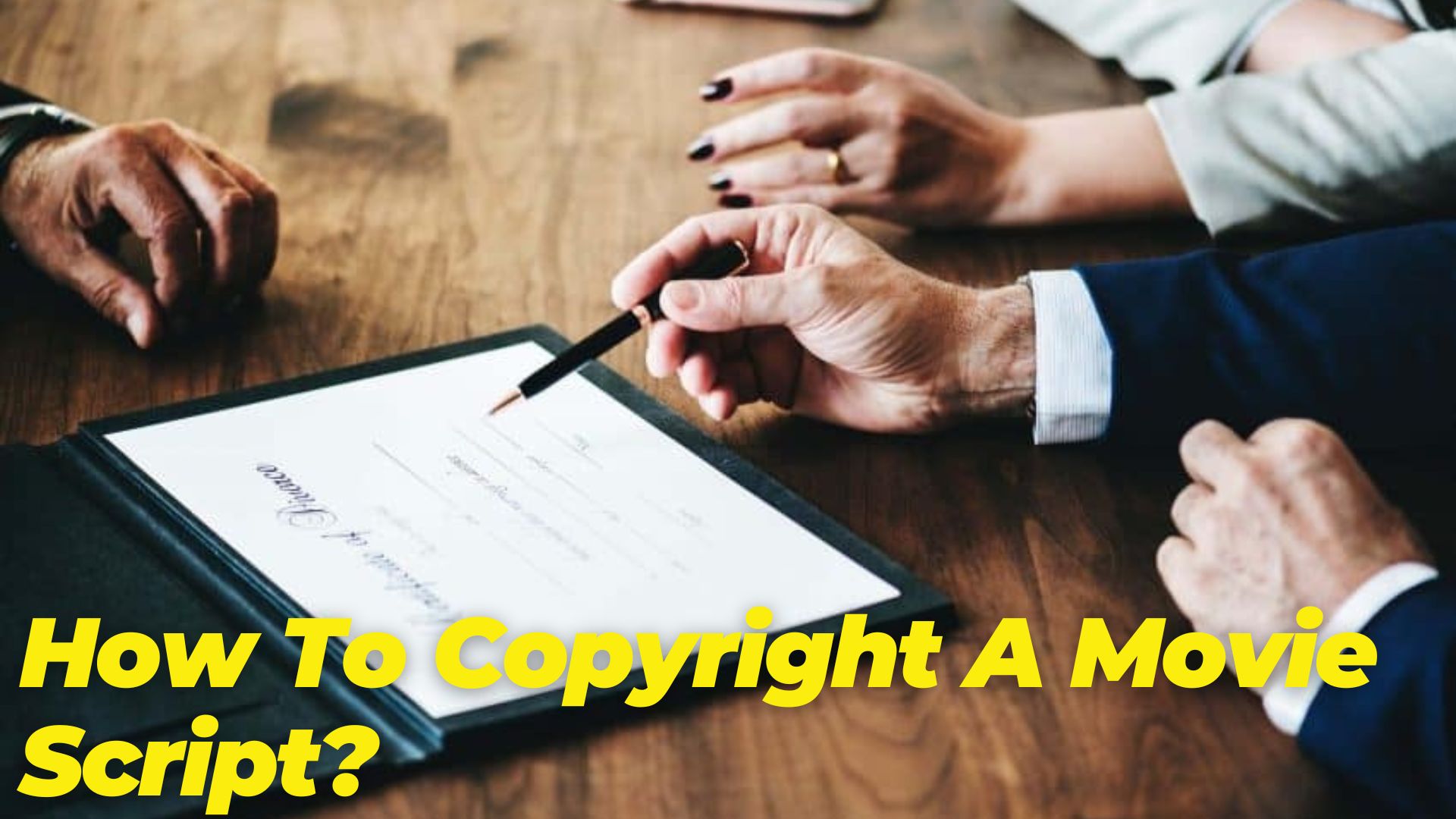How To Copyright A Movie Script?

Table of Contents
Creating a unique movie script is a significant accomplishment, and protecting your intellectual property is crucial to ensure your work remains exclusively yours. Trademarking a movie script is an essential step to safeguard your creative content and prevent unauthorized use. Here’s to learning how to trademark a movie script.
Why Copyright a Movie Script?
Copyrighting your movie script grants you the exclusive right to use the title and associated branding in connection with your film and related merchandise. This legal protection helps prevent others from using a similar title that could cause confusion among your audience. For instance, if you write a script titled “Galactic Quest,” trademarking it ensures that no other filmmaker can legally use a similar title, safeguarding your brand identity.
By Copyrighting your movie script, you ensure that you have exclusive rights to use the title in commerce. This exclusivity is vital in a competitive market where brand differentiation is key. For example, the title “Star Wars” is trademarked, ensuring that no other film or series can use a similar title, which helps maintain a strong and unique brand identity.
A registered trademark adds significant value to your movie script. It is a tangible asset that enhances your overall business worth. This can be particularly important if you plan to license your script for adaptations, merchandise, or other derivative works. A trademarked title adds credibility and can attract potential investors or partners.
Copyrighting your movie script acts as a deterrent to others who might consider using a similar title. When other filmmakers see that your title is trademarked, they are less likely to use a similar title, knowing it could lead to legal repercussions. This helps protect your brand from infringement and maintains its uniqueness.
Registering a trademark for your movie script demonstrates professionalism and a serious commitment to your brand. It shows that you are dedicated to protecting your creative work, which can enhance your reputation and build trust with your audience, producers, and partners.
Rebranding can be a costly and time-consuming process. By trademarking your movie script title early on, you can avoid the potential expenses associated with rebranding if another filmmaker claims your title or a similar one. This foresight can save you significant time and money in the long run.
If you plan to expand your movie franchise, having a trademark provides legal protection in other areas as well. Whether you’re launching sequels, entering new markets, or creating merchandise, a trademark ensures your script’s title and branding are protected across various platforms and products.
How to Copyright a Movie Script?
Copyrighting your movie script is a crucial step to protect your intellectual property and ensure others cannot use it without permission. Follow these steps to complete the copyright process:
Step 1: Decide How to File
You have three options for filing your copyright application:
- Direct Filing with the U.S. Copyright Office – This is the most cost-effective option and requires you to file your application directly through the U.S. Copyright Office website.
- Online Legal Services – You can use services like LegalZoom, which simplify the filing process and help you ensure that all required documents are submitted correctly.
- Hiring a Copyright Attorney – This option offers professional help, especially if you’re dealing with more complex legal situations, though it can be more expensive.
Step 2: Review the Fees
The fees for filing a copyright application depend on the type of work you’re registering and how you file. For a single movie script, filing directly online costs about $45, while other types of filings (like group registration) may have different costs. Always review the current fee schedule on the U.S. Copyright Office’s website before submitting your application.
Step 3: Conduct a Search
Although it’s not mandatory, it’s helpful to search the Copyright Office’s database to ensure no one else has already copyrighted a similar script or title. This step helps avoid potential conflicts later, particularly if you want to protect your title as well as your script.
Step 4: Provide Evidence of Originality
To qualify for copyright protection, your script must be original. During the application process, you’ll need to demonstrate that your work is unique and has not been copied. You may need to provide a detailed description or examples of how your script is distinct from existing works.
Step 5: Submit Your Application
Once you’ve gathered all required information, you can file your copyright application online or via mail. You’ll need to submit a copy of your movie script along with the application. If filing online, the process is usually faster, and you’ll receive an immediate confirmation.
Step 6: Monitor and Respond
After submission, the U.S. Copyright Office will review your application. If there are any issues or clarifications needed, they may contact you for additional details. You’ll need to respond promptly to address any concerns to avoid delays in processing.
Costs of Copyrighting a Movie Script
The cost for copyright registration in the USA is different from trademark registration. The U.S. Copyright Office charges the following fees for registering a work:
- Single author, same claimant, one work, not for hire: $45
- Standard application: $65
- Paper filing: $125
- Registration of a claim in a group of unpublished works: $85
- Collection of works: $85
- Sound recording: $50
- Supplementary registration: $50
Additional costs may include fees for special handling or additional services. The process is generally more affordable than trademark registration.
Why Trademark a Movie Script Title?
Trademarking a title like “Galactic Quest” prevents others from using a similar name, which could confuse your audience. With a registered trademark, your title becomes a valuable asset, especially if you plan to license or expand your story to merchandise. This protection adds credibility, reassures investors, and saves costs associated with potential rebranding.
Trademark Registration Process
Determine How to File
Choose to file directly through the USPTO, use an online legal service, or hire a trademark attorney.Fee Awareness
Review USPTO fees to understand costs, which vary by form type and filing complexity.Conduct a Trademark Search
Use the USPTO’s TESS database to ensure no similar trademarks exist.Build a Distinctive Argument
Demonstrate the uniqueness of your title through its commercial use, advertising, and consumer recognition.Complete Your Application
File through TEAS, provide necessary details, and submit specimens like marketing materials.Monitor and Respond
Be prepared for office actions and consider professional help to address any objections.
Trademarking vs. Copyrighting in Movie Script
Famous titles like Star Wars are trademarked, securing brand identity across products. Copyright protects script content, while a trademark protects title and brand in commerce, both essential in entertainment.
By investing in trademarking, you strengthen brand reputation, attract investment, and secure your script’s title across future projects. Contact us for guidance in navigating the trademark process with confidence.
Contact Us:
Investing in a copyright not only adds value to your brand but also enhances your professional reputation. If you have any questions or need assistance with trademarking a movie script, our team of experts is here to help.

Elena Morrison
Cynthia Davis is a freelance writer and journalist specializing in legal topics. With a keen interest in law, intellectual property, and business regulations, she provides insightful analysis and practical advice to her readers. Cynthia’s work often delves into complex legal issues, breaking them down into accessible content for businesses and individuals alike.




